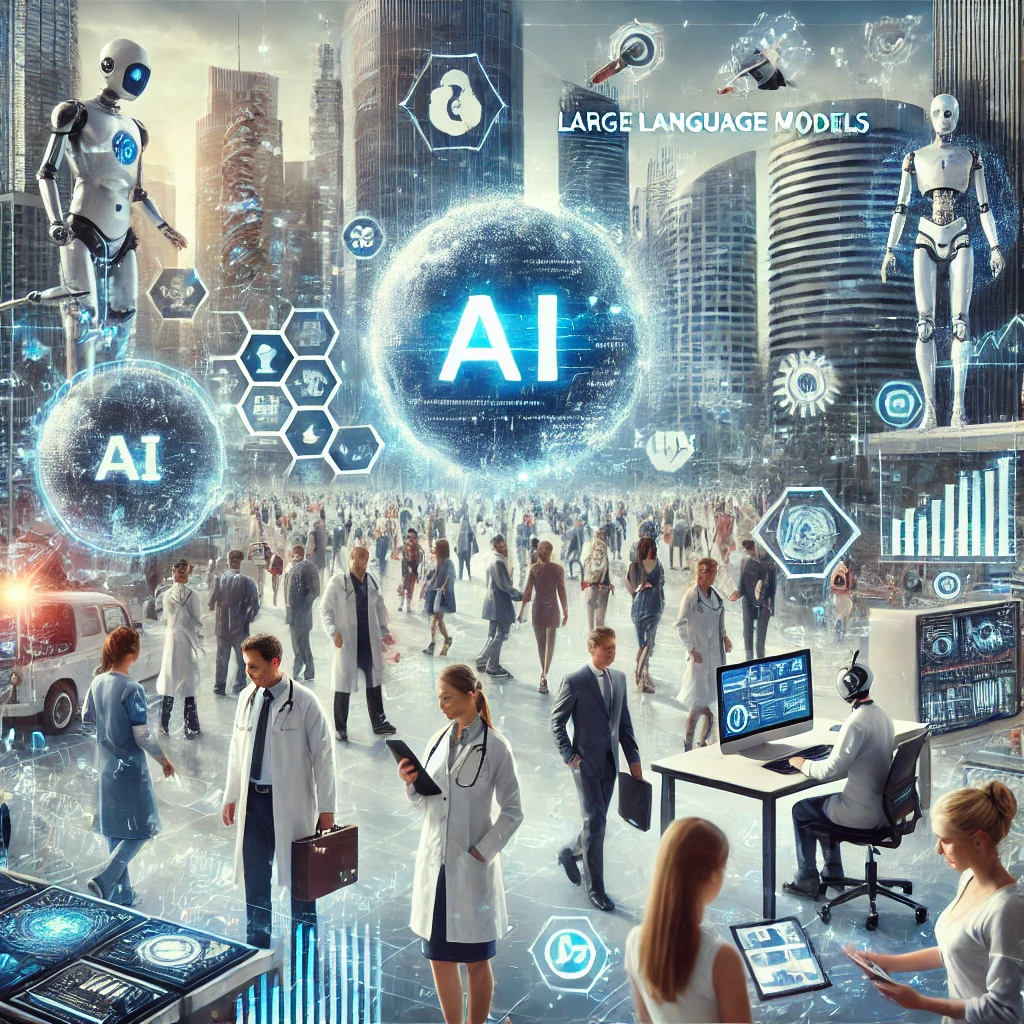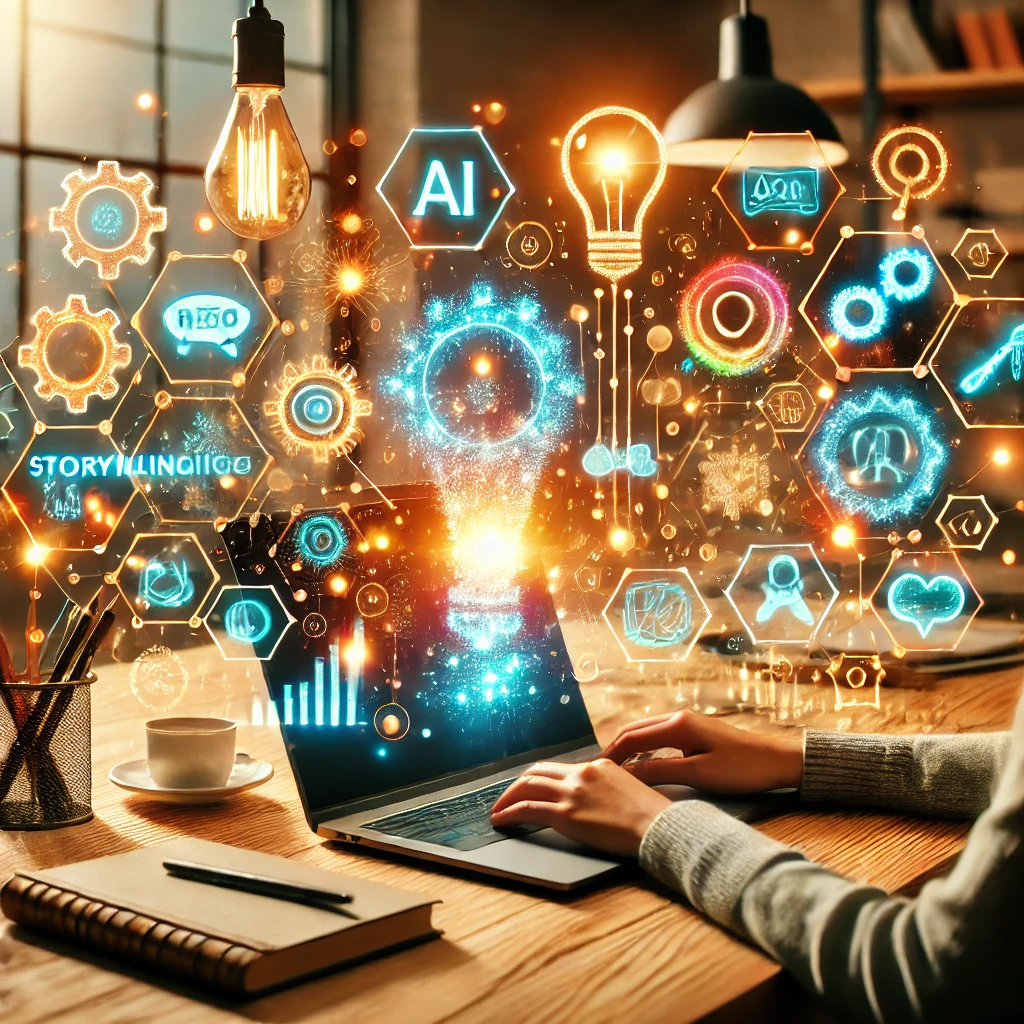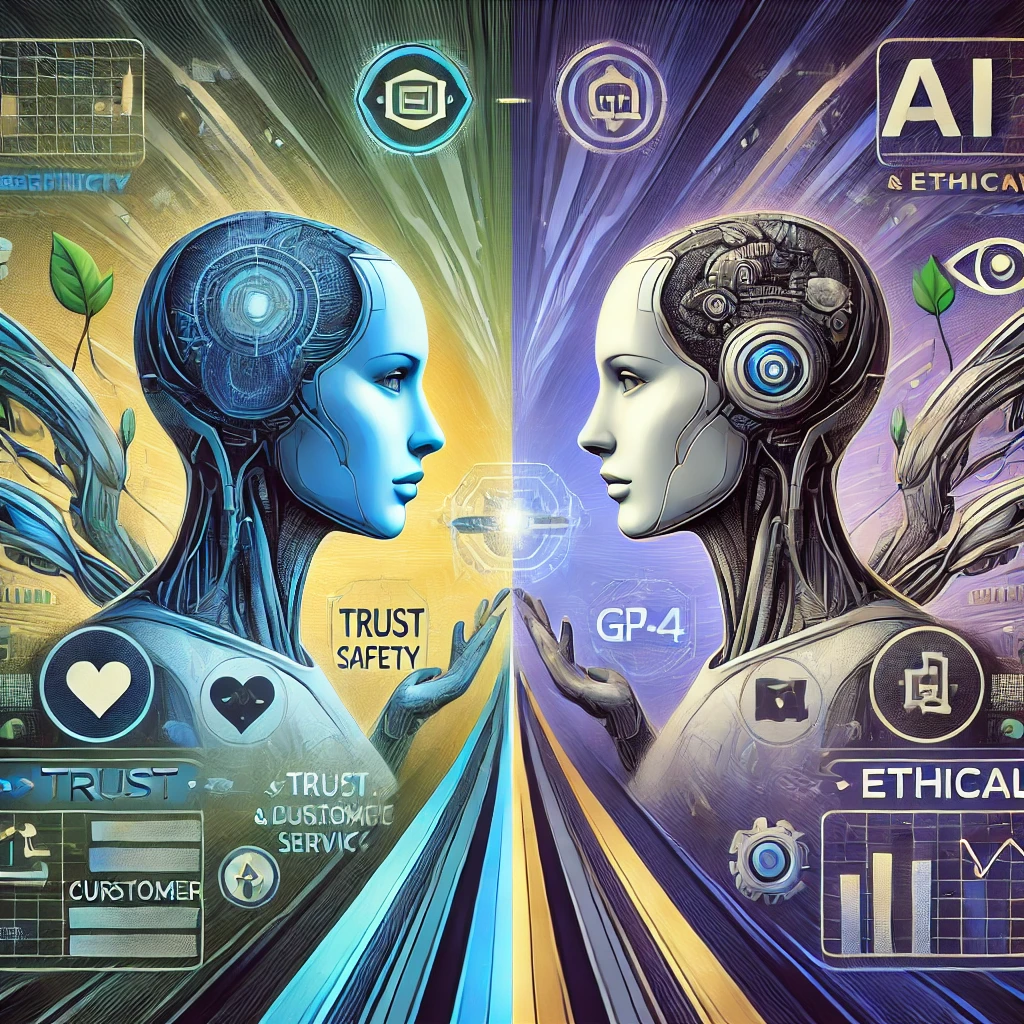AI in the Metaverse: A New Digital Frontier

Introduction
AI in the Metaverse: What’s the Next Digital Frontier? Imagine a world where virtual and physical realities seamlessly blend, where you can attend a meeting, shop for digital goods, or explore breathtaking landscapes—all without leaving your home. This is the Metaverse, a dynamic and immersive digital realm that’s reshaping how we connect, work, and play.
At the heart of this transformation lies Artificial Intelligence (AI). From creating lifelike avatars to personalizing virtual experiences, AI is not just a tool—it’s the driving force that’s unlocking the full potential of the Metaverse. By combining advanced algorithms with immersive technologies, AI is crafting a new digital frontier, one where innovation knows no bounds.

In this article, we’ll explore how AI is revolutionizing the Metaverse, from powering intelligent interactions to building expansive virtual worlds. Dive in to discover how these cutting-edge technologies are shaping the future of human interaction and creativity.
AI in the Metaverse: Understanding the Metaverse
The Metaverse isn’t just a buzzword—it’s a transformative concept that promises to redefine how we live, work, and interact in the digital age. Picture a vast, interconnected virtual universe where you can attend concerts, collaborate with colleagues, or even shop in immersive 3D environments. Far from being science fiction, the Metaverse is rapidly becoming a reality, powered by advancements in Virtual Reality (VR), Augmented Reality (AR), and blockchain technologies.
At its core, the Metaverse is about creating shared, persistent digital spaces that replicate and enhance real-world experiences. Unlike traditional online platforms, it offers a sense of presence, enabling users to not only consume content but also actively participate and co-create within these virtual worlds.
This digital frontier is more than just a playground for gamers and tech enthusiasts—it’s an emerging ecosystem with the potential to revolutionize industries like education, healthcare, entertainment, and commerce. By breaking down geographical barriers and fostering new ways to connect, the Metaverse is set to become a cornerstone of the digital economy.

In the following sections, we’ll dive deeper into how Artificial Intelligence is enabling these virtual spaces to evolve, making the Metaverse more intelligent, personalized, and interactive than ever before.
The Role of AI in the Metaverse
The Metaverse may be the stage, but Artificial Intelligence (AI) is the masterful director orchestrating every scene. Without AI, the Metaverse would lack the depth, intelligence, and seamless interactivity that make it truly revolutionary. AI acts as the backbone, powering everything from realistic environments to dynamic user experiences, ensuring that virtual worlds feel as engaging and alive as the real one.
Here’s how AI is transforming the Metaverse:
- AI in the Metaverse: Intelligent Avatars
Imagine meeting an avatar that not only resembles you but also understands and adapts to your emotions. AI enables the creation of hyper-realistic, emotionally intelligent avatars that can mimic facial expressions, respond naturally to conversations, and even reflect your unique personality. These avatars redefine digital identity, making virtual interactions feel more human. - AI in the Metaverse: Content Creation at Scale
Creating expansive virtual worlds manually is a monumental task—but AI simplifies it. With procedural generation, AI can design intricate landscapes, realistic textures, and entire environments in minutes. Tools powered by Generative AI are helping developers craft immersive worlds faster than ever, opening endless possibilities for creativity. - AI in the Metaverse: Real-Time Interactions
AI brings life to the Metaverse through Natural Language Processing (NLP). Whether you’re conversing with other users or interacting with virtual guides, AI ensures seamless communication by understanding and responding in real-time. AI also powers multilingual support, breaking language barriers for global participation. - AI in the Metaverse: Personalized Experiences
AI analyzes user behavior and preferences to tailor experiences, ensuring that no two Metaverse journeys are the same. From recommending virtual events to customizing your digital surroundings, AI creates a deeply personalized and immersive environment for everyone. - AI in the Metaverse: Non-Playable Characters (NPCs) with a Brain
Gone are the days of static NPCs with limited dialogue. AI-driven NPCs in the Metaverse are intelligent, adaptive, and interactive. They can serve as virtual shop assistants, tour guides, or collaborators in creative projects, adding depth and engagement to virtual experiences.
Integrating AI, the Metaverse transforms from a static digital space into a living, breathing ecosystem where innovation thrives. The next sections will explore how these advancements are applied across industries and the opportunities they unlock.
Applications of AI in the Metaverse
As the Metaverse continues to evolve, Artificial Intelligence is playing a pivotal role in transforming entire industries. From gaming to education, healthcare to commerce, AI-powered innovations are shaping the way we interact, learn, work, and shop in virtual environments. Let’s explore some of the most exciting applications of AI in the Metaverse and how they’re pushing boundaries in these sectors.
- AI in the Metaverse: AI-Powered Gaming Experiences
The Metaverse has become a playground for gamers, and AI is taking these virtual worlds to new heights. AI enables dynamic game environments where worlds change in response to player actions, making every experience unique. AI-driven NPCs (non-playable characters) have become more intelligent, providing real-time, responsive interactions that enhance gameplay. Whether it’s an NPC learning your strategies or the game world adapting to your decisions, AI creates an immersive, evolving gaming experience.
2. AI in the Metaverse: Virtual Education with AI Tutors
AI in the Metaverse is revolutionizing education by offering immersive learning environments that adapt to students’ needs. Virtual classrooms allow students to interact with AI tutors, who personalize lessons based on their learning styles, progress, and interests. AI can even assess a student’s emotional state through emotion recognition, helping tutors provide a more empathetic and tailored learning experience. The result is a more engaging and effective way to learn, where students can access global education without leaving their homes.
3. AI in the Metaverse: Virtual Consultations and Simulations
AI is transforming healthcare by enabling virtual consultations and medical simulations in the Metaverse. Virtual clinics powered by AI offer patients remote consultations with doctors or AI-driven avatars that can perform basic diagnostics. In medical training, AI-generated simulations allow students to practice surgeries, diagnose diseases, and even interact with virtual patients, all within a controlled digital environment. This technology improves accessibility, reduces costs, and accelerates learning in the medical field.
4. AI in the Metaverse: Virtual Commerce and AI-Driven Shopping
AI is revolutionizing commerce within the Metaverse by creating AI-powered marketplaces and virtual shopping experiences. From personalized product recommendations to virtual try-ons, AI uses data from user preferences and behaviors to tailor the shopping journey. Imagine trying on clothes in a virtual store where the AI suggests outfits based on your taste, or exploring a digital marketplace where AI curates product displays based on your browsing history. AI ensures a seamless, personalized shopping experience in the Metaverse.
4. AI in the Metaverse: Collaborative Workspaces in the Metaverse
The Metaverse is becoming a new frontier for remote work and virtual collaboration. AI enables productivity tools within virtual offices that allow teams to work together in real-time, no matter where they are in the world. AI-powered virtual assistants streamline tasks, set reminders, and help manage meetings. Whether it’s a brainstorming session in a virtual meeting room or designing a product prototype in a 3D space, AI tools are enhancing productivity and collaboration across industries.

AI’s applications in the Metaverse are vast and rapidly expanding, offering exciting opportunities for innovation and growth in numerous sectors. As we continue to see these technologies converge, the lines between the physical and virtual worlds will blur, creating new possibilities for users and businesses alike.
Benefits of AI in the Metaverse
The integration of Artificial Intelligence into the Metaverse isn’t just enhancing the user experience—it’s unlocking a world of benefits that are reshaping the way we interact with digital environments. From immersive realism to personalized experiences, AI is driving the Metaverse forward, making it more interactive, engaging, and efficient. Here’s how AI is elevating the Metaverse to new heights:
- AI in the Metaverse: Enhanced Realism and Immersion
AI is the engine behind the lifelike environments and experiences in the Metaverse. By using AI algorithms, virtual worlds can now mimic real-world physics, lighting, and textures, creating hyper-realistic spaces that feel almost indistinguishable from reality. Whether you’re exploring a digital city, interacting with AI-powered avatars, or experiencing a virtual event, AI makes these moments feel tangible and immersive. The level of realism AI brings to virtual environments elevates user engagement, making the Metaverse feel less like a game and more like a new dimension.
2. AI in the Metaverse: Personalization for Every User
One of the most exciting benefits of AI in the Metaverse is its ability to personalize every aspect of a user’s experience. AI constantly learns from your behavior and preferences, adapting to your needs in real-time. Whether it’s curating content based on your interests or recommending virtual events and experiences, AI ensures that no two journeys through the Metaverse are the same. This personalization creates a sense of belonging, making virtual spaces more relevant and engaging for individual users.
3. AI in the Metaverse: Scalability of Virtual Worlds
Building vast, interconnected virtual worlds requires an enormous amount of effort, but AI makes this task easier. Through procedural generation and machine learning, AI can design and evolve expansive virtual spaces autonomously, allowing for the creation of entire cities or ecosystems with minimal human input. This scalability means the Metaverse can grow in real-time, with new areas and experiences continuously emerging, giving users an endless supply of fresh content and environments to explore.
4. AI in the Metaverse: Intelligent Interactions
AI powers real-time communication and dynamic interactions in the Metaverse. Natural Language Processing (NLP) allows users to converse with virtual characters and other users in their preferred language, creating smoother, more natural conversations. Additionally, AI can help interpret emotions through voice or facial recognition, allowing avatars and virtual characters to respond empathetically. These intelligent interactions enhance social connections, making virtual spaces feel more authentic and interactive.
5. AI in the Metaverse: Seamless Automation of Tasks
AI streamlines processes and automates tasks, improving productivity across the Metaverse. Whether it’s generating content, moderating environments, or handling transactions, AI reduces the time and effort required from users and creators. For businesses operating in the Metaverse, AI enables automation of key tasks like customer service, virtual assistant functions, and content management, making it easier to scale and manage virtual spaces.

In short, AI is transforming the Metaverse from a passive environment into a dynamic, personalized, and scalable universe that enhances how we interact with digital worlds. With its ability to improve immersion, automate processes, and create customized experiences, AI is not just improving the Metaverse—it’s redefining what’s possible in virtual reality.
AI in the Metaverse: Challenges and Ethical Considerations
As AI continues to play a critical role in shaping the Metaverse, it brings not only groundbreaking benefits but also significant challenges and ethical questions. While the integration of AI in virtual spaces holds immense promise, there are concerns surrounding privacy, inclusivity, and accessibility that need to be addressed. Here, we explore the key challenges and ethical considerations of AI in the Metaverse and how we can ensure its responsible and equitable development.
- AI in the Metaverse: Privacy and Data Security
With AI constantly collecting and analyzing user data to personalize experiences, privacy is a major concern. In the Metaverse, every interaction—from shopping preferences to emotional responses—can be monitored and recorded. This raises important questions about data security and user consent. How do we protect users’ personal information in an environment where data is constantly being generated and processed? Stricter regulations and transparent data management practices are essential to safeguard user privacy and ensure that AI’s capabilities are not misused.
2. AI in the Metaverse: Bias and Inclusivity in AI Algorithms
AI systems are only as unbiased as the data they are trained on, and if these datasets reflect societal inequalities, AI may inadvertently perpetuate those biases in virtual spaces. In the Metaverse, this could result in unfair representation of certain groups, creating environments that are exclusive rather than inclusive. To build an equitable digital world, it’s crucial to ensure that AI algorithms are diverse, inclusive, and constantly monitored for fairness. This will help ensure that all users, regardless of their background, feel represented and welcomed in the Metaverse.
3. AI in the Metaverse: Accessibility in the Metaverse
While the Metaverse offers exciting new opportunities for interaction and creativity, not everyone has access to the advanced technology required to engage with it. High-end VR headsets and powerful computing hardware can be prohibitively expensive, leaving many people excluded from these immersive experiences. AI can play a role in making the Metaverse more accessible by developing lower-cost, lighter-weight technologies, and creating alternative ways to interact with the digital world, such as through mobile devices or voice-controlled interfaces. Bridging the digital divide will be critical to ensuring that the Metaverse is inclusive and available to a global audience.
4. AI in the Metaverse: Ethical Use of AI in Content Creation
AI-powered content creation tools are transforming industries, but they also raise questions about authorship, ownership, and intellectual property. In the Metaverse, where AI can generate everything from virtual landscapes to digital artworks, who owns the content? Should creators be compensated for AI-generated content that resembles their own style or ideas? These questions challenge traditional notions of intellectual property and will require new frameworks to protect creators’ rights while encouraging innovation.
5. AI in the Metaverse: Psychological and Social Impact
While AI-enhanced virtual environments can provide entertainment, learning, and work opportunities, they also pose risks to mental health and social well-being. Spending extended periods in immersive virtual worlds can lead to issues like digital addiction, isolation, and social disconnection. As the Metaverse grows, it will be important to ensure that AI promotes positive social interactions and doesn’t enable harmful behaviors, such as cyberbullying or harassment. AI should be designed to prioritize user well-being, creating a safer and healthier digital environment.

Addressing these challenges will be key to ensuring that AI in the Metaverse evolves responsibly and benefits all users. By focusing on privacy, inclusivity, accessibility, and ethical content creation, we can build a Metaverse that not only innovates but also prioritizes the values that make digital worlds truly human.
Conclusion: Embracing the Future of AI in the Metaverse
The fusion of AI and the Metaverse is undoubtedly one of the most exciting developments in the digital age, unlocking a world of possibilities for industries, creators, and users alike. From creating immersive experiences in gaming and education to revolutionizing healthcare, real estate, and retail, AI is reshaping how we interact with and navigate digital spaces. It is not only enhancing user engagement but also driving innovation across various sectors, transforming industries in ways that were once thought impossible.
However, as with any technological advancement, the growth of AI within the Metaverse brings forth significant challenges that need to be addressed. Ethical concerns around privacy, security, bias, job displacement, and mental health must be carefully considered to ensure the Metaverse remains a safe, inclusive, and equitable space. Establishing transparent governance, prioritizing digital well-being, and promoting accessibility for all users will be crucial in ensuring that the potential of AI in the Metaverse benefits everyone.
The Metaverse is still in its early stages, and as AI continues to evolve, so too will the opportunities and ethical dilemmas it presents. To fully embrace this new digital frontier, we must navigate these challenges with responsibility, foresight, and a commitment to creating a future where technology serves humanity in the most positive and empowering ways possible.
As we step into this new era, the integration of AI in the Metaverse offers a glimpse into a future where digital and physical realities blend seamlessly, creating limitless opportunities for creativity, collaboration, and growth. By embracing the potential of AI while staying mindful of its challenges, we can unlock a new world of possibilities and continue to shape a Metaverse that reflects our collective vision for the future.









Thanks for sharing. I read many of your blog posts, cool, your blog is very good.